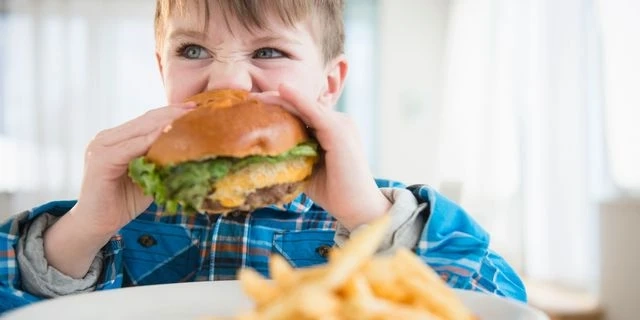A hidden struggle lurks in the peaceful hallways of childhood, where laughter should reign and dreams shall know no bounds—one that is frequently eclipsed by its physical manifestations. Childhood obesity, a growing health epidemic in our modern world, with broad implications that go far off the charts.
It knits strings of self-doubt, isolation, and, at times, the terrifying shadow of desperation into the delicate fabric of mental well-being. The link between pediatric obesity and mental health is multilayered and severe, requiring our awareness and compassion. We begin on a trip across the emotional landscapes of young hearts in this inquiry, hoping to shed light on the shadows that endure.
Coping Mechanisms and Unhealthy Habits
Emotional Eating in Childhood: Emotional eating is the practice of utilizing food to relieve or manage emotional pain. While this behavior is not unique to children, it can have a substantial influence on their overall health, especially if it becomes a repeated practice. Understanding why some youngsters turn to emotional eating and the ramifications of this behavior is critical.
1. Emotional Triggers: Children, like adults, have a wide range of emotions, ranging from anxiety and stress to grief and frustration. When confronted with strong emotions, they may lack the emotional maturity or coping skills needed to deal with them properly. As a result, children may seek consolation or diversion via eating. As a result, emotional eating might become a trained reaction to emotional stressors.
2. The Vicious Cycle: Emotional eating frequently results in a vicious cycle. When a child eats in reaction to their emotions, they may feel temporarily relieved of their misery. However, this relaxation is frequently fleeting and is followed by guilt, embarrassment, or physical discomfort. This cycle of eating to cope with emotions and then experiencing bad feelings as a result of eating can lead to the perpetuation of harmful habits.
3. Impact on Obesity and Health: One of the most alarming elements of children's emotional eating is its connection to childhood obesity. Emotional eating frequently results in the ingestion of high-calorie, low-nutrient meals, resulting in weight gain. Long-term health implications may include an increased risk of chronic illnesses such as diabetes and heart disease.
4. Emotional Health Consequences: mental eating has an impact on both physical and mental wellbeing. Children who rely on food as their major coping mechanism may experience low self-esteem, body image difficulties, and an unhealthy relationship with food. These emotional consequences can increase their psychological struggles.
5. Addressing the Issue: It is imperative to spot emotional eating in kids in order to intervene. Parents, caregivers, and educators may all play important roles in assisting children in developing healthy coping skills. This involves teaching emotional awareness as well as alternate coping mechanisms such as exercise, mindfulness, artistic outlets such as paint by numbers landscape, or seeking emotional support through talk or counseling.
The Link Between Childhood Obesity, Bullying, and Mental Health
Childhood obesity frequently exposes children to an increased risk of bullying and societal stigma as a result of their weight. This link is crucial to comprehend since it has serious ramifications for their mental health.
1.Increased Vulnerability to Bullying: Obese children are more likely to be bullied at school and in social contexts. Bullies may insult, use abusive language, or support body-shaming conduct. This continuous harassment might cause mental discomfort.
2.Stigmatization: Obesity stigma is a widespread phenomenon in our society, and children are not immune to its effects. They may face prejudice, unfavorable stereotypes, and bias from peers as well as adults. This societal discrimination might have a negative impact on their self-esteem.
3.Emotional Consequences: Bullying and stigma can have serious consequences for a child's mental health. It can result in emotions such as shame, low self-esteem, and sadness. These emotional difficulties might last until puberty and adulthood and in some cases they can push and persist till adulthood.
4.Body Image Issues: Obese children may acquire unfavorable body image beliefs, which might make them more vulnerable to mental health issues. They may feel compelled to comply with unattainable beauty standards, lowering their self-esteem even further.
Healthy Coping Strategies for Kids
1.Open Communication: Make a non-judgmental environment for your youngsters to express their emotions. Encourage them to communicate their emotions.
2.Emotional Awareness: Assist your child in identifying and labeling their emotions. Teach children that experiencing a wide range of emotions is normal.
3.Mindfulness Techniques: To assist your kid in managing stress and emotional triggers, provide mindfulness techniques such as deep breathing or meditation.
4.Physical Activity: Encourage frequent physical exercise, which boosts happiness by releasing endorphins. tap into the most enjoyable activities for your kid to ensure maximum engagement.
5.Healthy Coping Alternatives: engaging in creative hobbies like art, music, or writing. Painting is a particularly effective form of creative expression. When children are feeling overwhelmed or anxious, providing them with art supplies that taps into their favorite characters such as paint by numbers birds, you might want to consider joining them for a sense of compassion and companion, a shared artistic session through paint by numbers kits for adults, for a better chance to bound and get closer to your children.
6.Positive Reinforcement: Recognize your child's attempts to create healthy coping mechanisms. Celebrate their accomplishments and boost their confidence.
7.Be a Role Model: - Demonstrate suitable ways to cope by positively managing your own stress and emotions.
Compassion and tolerance are our primary allies as we assist youngsters cope with emotional difficulties. Keep in mind the uniqueness of each child, and their road to emotional resilience may emerge at their own speed. Our continuous support and understanding as caretakers and guides pave the road for them to develop better coping methods and a brighter, more emotionally balanced future.



